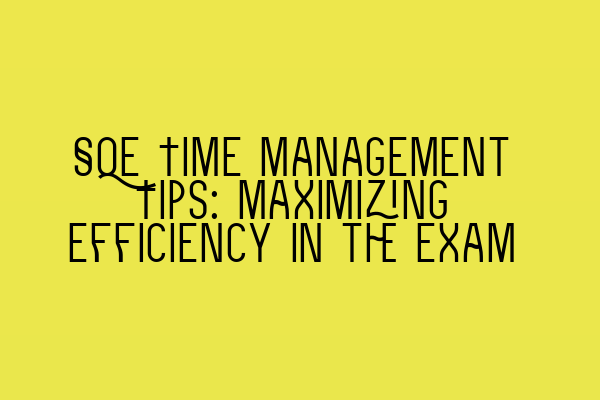SQE Time Management Tips: Maximizing Efficiency in the Exam
Preparing for the Solicitors Qualifying Examination (SQE) requires not only mastering the substantive law and legal skills but also effectively managing your time during the exam. Time management is crucial to ensure that you can complete all the questions and perform at your best. In this article, we will provide you with essential time management tips to help you maximize your efficiency in the SQE exam.
1. Familiarize Yourself with the Exam Structure
Before diving into time management strategies, it is important to have a clear understanding of the SQE exam structure, including the number of questions, the time allotted for each section, and the format of the questions. By knowing the structure in advance, you can plan your time effectively and allocate sufficient time to each question.
Related Article: Unveiling the Solicitors Qualifying Examination (SQE): What You Need to Know
2. Create a Time Allocation Plan
Before the exam, create a time allocation plan to ensure that you use your time wisely. Determine how much time you should spend on each question and section based on the weightage of marks. For example, if a question carries more marks, allocate more time to it. This plan will serve as a roadmap during the exam and help you stay on track.
3. Practice Time-Bound Mock Exams
Take advantage of SQE mock exams to practice managing your time effectively under exam conditions. These mock exams will familiarize you with the pressure and time constraints of the real exam, allowing you to adapt your strategies accordingly. After each mock exam, analyze your time usage and identify areas where you can improve your efficiency.
Related Article: SQE Mock Debrief Sessions: Analyzing Your Performance for Growth
4. Use the ‘Flagging’ Technique
During the exam, if you encounter a challenging question that is taking up too much of your time, use the ‘flagging’ technique. ‘Flag’ the question and move on to the next one. By flagging difficult questions, you can come back to them later when you have more time, ensuring that you don’t get stuck and waste valuable minutes on a single question.
5. Prioritize the Easy Questions
Divide your time wisely by prioritizing the easier questions. Start with the questions you are most confident in, as they will require less time and mental energy. By tackling the easier questions first, you not only boost your confidence but also create a momentum that can help you manage your time more effectively for the remaining questions.
6. Avoid Spending Excessive Time on Research
While legal research is an important skill, spending excessive time on research during the exam can eat up your valuable time. Instead, focus on applying your existing legal knowledge to answer the question. Remember, the SQE exam primarily tests your understanding of the law, not your ability to conduct extensive research within the limited exam time.
7. Keep an Eye on the Clock
Stay mindful of the time throughout the exam. Have a watch or use the clock provided in the exam room to keep track of the time remaining. Regularly check the clock to ensure that you are progressing according to your time allocation plan. This will help you avoid running out of time before completing all the questions.
8. Review and Proofread
Allocate a few minutes at the end of the exam to review and proofread your answers. While it’s essential to manage your time during the exam, it is equally important to ensure the accuracy and clarity of your responses. Use the remaining time to make any necessary revisions and correct any errors you may have made during the initial writing.
Related Article: Tips for SQE Success: Key Pointers for a Stellar Performance
Conclusion
Effective time management is crucial to achieving success in the Solicitors Qualifying Examination (SQE). By familiarizing yourself with the exam structure, creating a time allocation plan, practice time-bound mock exams, utilizing the ‘flagging’ technique, prioritizing easier questions, avoiding excessive research, keeping an eye on the clock, and reviewing your answers, you can maximize your efficiency and increase your chances of performing at your best.
Related Articles:
- SQE Mock Debrief Sessions: Analyzing Your Performance for Growth
- Unveiling the Solicitors Qualifying Examination (SQE): What You Need to Know
- Tips for SQE Success: Key Pointers for a Stellar Performance
- Comprehensive SQE Prep Resources: Your Key to Exam Readiness
- SQE Prep Resources: Essential Materials for Exam Preparation

Leave a Reply